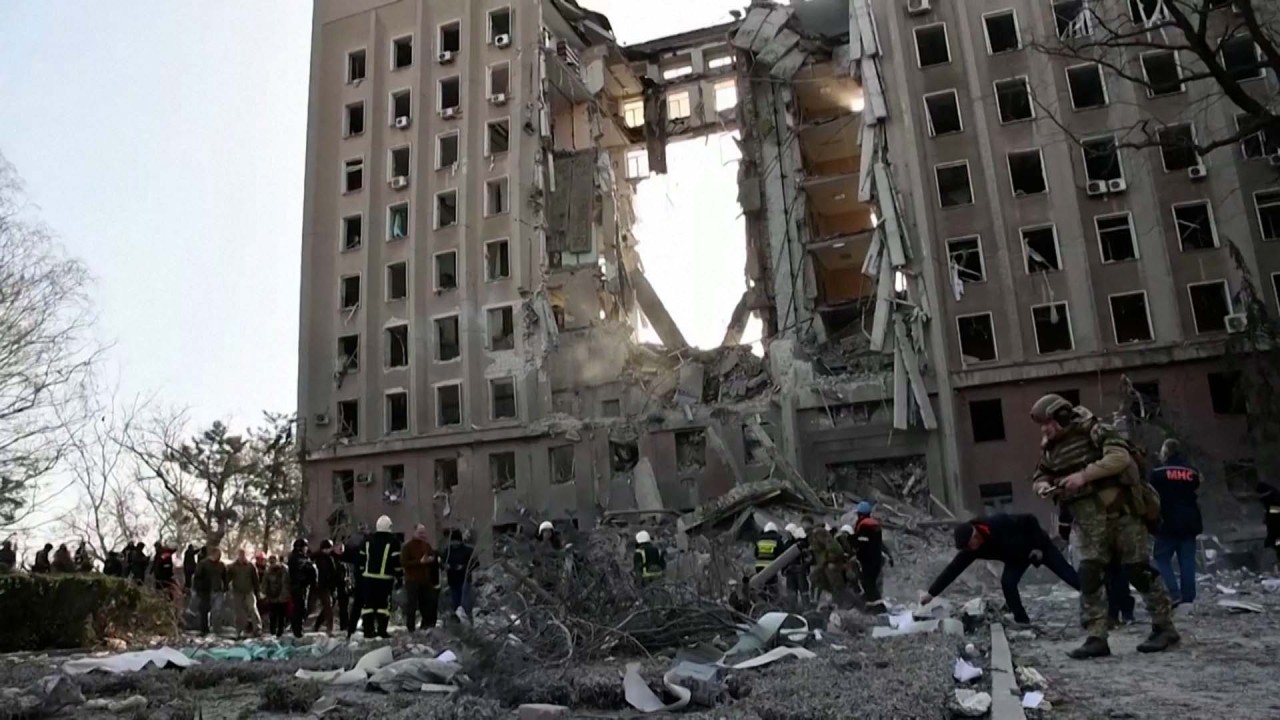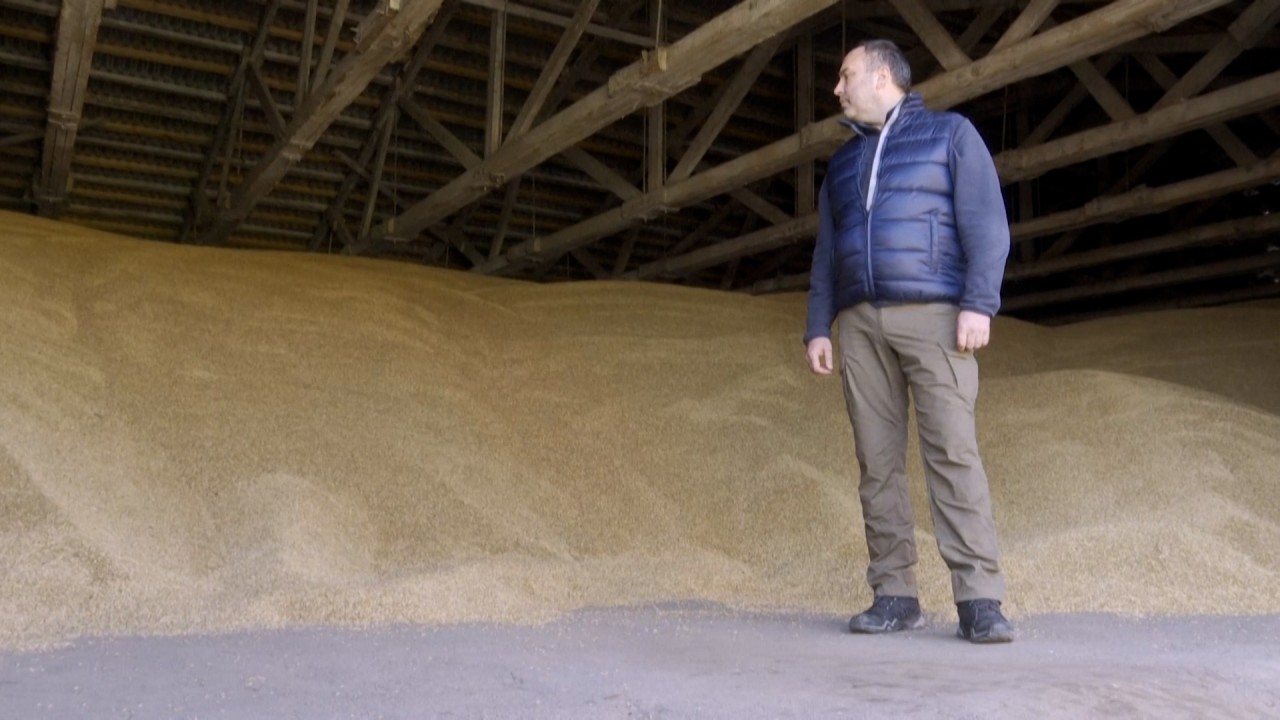
EU-China summit: cooperation on Ukraine but Beijing won’t commit to pressing Russia
- ‘We exchanged very clearly opposing views,’ European Commission President Ursula von der Leyen says
- President Xi Jinping says China ‘supports the EU playing a leading role’ in talks, and also supports dialogue ‘between Europe, Russia, the United States and Nato’
In their first summit in almost two years, EU and Chinese leaders agreed on Friday to cooperate in trying to resolve Russia’s invasion of Ukraine, even if, as European Commission President Ursula von der Leyen put it, they held “clearly opposing views” on the conflict.
However, the European Union did not secure any firm commitment from Beijing to use its influence on Russia to stop the assault – a stated aim heading into the meeting.
At a news conference in Brussels following the virtual session, von der Leyen said that “we exchanged very clearly opposing views. This is not a conflict. This is a war. This is not a European affair. This is a global affair.”
She added that “we made very clear that China should, if not support, at least not interfere with our sanctions” of Russia “and that equidistance is not enough; that active engagement for peace is important and that each player should play its role.
“And therefore this exchange of views was of utmost importance.”

Chinese President Xi Jinping, according to a Chinese government account of the meeting, said that “China supports the EU’s efforts to resolve the Ukraine issue politically, adding that Beijing would work with Europe “to jointly prevent a larger-scale humanitarian crisis”.
Xi said he “supports the EU playing a leading role” in talks, and also supported dialogue “between Europe, Russia, the United States and Nato”– without saying that China would participate, according to the account.
“The root cause of the Ukrainian crisis lies in the regional security conflicts that have accumulated in Europe for a long time. The fundamental solution is to accommodate the legitimate security concerns of all parties concerned.”
Unable to reach agreement, the EU set out to remind China of the economic risks of a prolonged war in Ukraine and, according to an official in attendance, “the message was clearly understood”.
Lavrov briefs Beijing on Ukraine in first China visit since invasion
On other issues, the two sides agreed to restart a human rights dialogue that was cancelled in the wake of bilateral sanctioning last year, but this was the only concrete deliverable from a summit that was low on expectations from the outset.
Von der Leyen also emphasised areas of cooperation, including on climate, food and energy security, and global health.
She said that Brussels was ready to offer China vaccine support to contain its severe coronavirus outbreak that has left huge swathes of the population on lockdown.
“We are always willing to share expertise and support in this matter with China,” von der Leyen said.
The 23rd EU-China summit was divided into two virtual parts, with Chinese Premier Li Keqiang first speaking for two hours with von der Leyen, European Council President Charles Michel and the EU’s top diplomat Josep Borrell.
These talks were dominated by issues like trade grievances – including China’s alleged coercion of Lithuania – climate change cooperation, and human rights concerns, said an EU official who attended the talks.
In the afternoon, the same three EU officials spoke with Xi for an hour, in talks dominated by Ukraine.
During this segment, the source said, the EU requested that Xi speak with Ukrainian President Volodymyr Zelensky, given that the two leaders had had no direct contact since the war began.
Xi referred to Ukraine as one of three major crises coming “one after another”, along with the coronavirus pandemic and a global economic recovery, that he described as “long and torturous”.
He added that both sides should “play a constructive role, and provide some insights into [solving] the turbulent world situation”, according to the Chinese government account.

Speaking to reporters after the summit, Michel dodged a question about whether China had committed to not provide military, economic or sanctions-circumvention support to Moscow, which had been described as a “red line” ahead of the event.
Instead, Michel said the EU and China “share the same goals, we want peace, we want prosperity, we want security”.
“Today’s summit is not business as usual, because this is a wartime summit,” Michel added.
“This global instability is not in China’s interest and not in the EU’s interest. We share our responsibility as double actors to work for peace and stability. We call on China to help end the war in Ukraine. China cannot turn a blind eye to Russia’s violation of international law.”
Li said that China was willing to play a “constructive role” in resolving the war and that it had been “promoting peace talks in its own way”, according to an account on Chinese state media that emphasised Beijing’s desire to “deepen cooperation”.
Li told the EU that Beijing “opposes both a hot war and a cold war; it opposes division of blocs and taking sides”, China’s Director General for European Affairs Wang Lutong posted on Twitter.
Despite European concerns about restricted access to the Chinese market, Li told the EU that “reform and opening up is China’s basic state policy”.
According to the Chinese account, Li hoped that the two sides would “adhere to two-way opening up”, a reference to an investment deal that has been frozen following a dispute about Beijing’s human rights record.
In the run-up to the summit, there were clear gaps on where both sides wished to see the focus.
In an article for Euronews, Wang Hongjian, China’s interim chargé d’affaires to the EU, focused on the need for cooperation.
China willing to give military support to Russia for Ukraine war, US tells EU
“The harsh realities of today’s world, battered and bruised by unilateralism, protectionism, and the pandemic, call for China and the EU to set aside their differences and meet each other halfway,” he wrote.
The EU, meanwhile, was keen to discourage China from actively supporting the Russian invasion.
Senior EU officials described China’s position on the conflict as “the million-dollar question”, adding that any assistance to Russia would be considered a “red line” that would damage EU-China ties.
The provision of any military, financial or sanction-circumvention support by China to Russia would be viewed as evidence in Brussels that Beijing is “no longer neutral”, a senior official said.
Multiple EU officials said that they had seen substantial evidence of Russia requesting Chinese assistance on all three fronts, but had yet to see Beijing proffer material support.
“We have certainly seen the formal request of the Russians to the Chinese for military equipment and I think even including rations, although they seem to be relatively easy to purchase on eBay,” said one senior official.
A second said there had been “intensive discussions” between Russia and China regarding the provision of financial support, but that Brussels had not seen hard evidence of China delivering.
However, there was no expectation in Brussels that China would condemn Russia or offer support for Western-led sanctions. Instead, they were looking for “a demonstration of China’s positive resolve to help stop this conflict”.
“It’s no secret China has been playing a balancing act, keeping a position that suits its own interests. I don’t think that is likely to fundamentally change,” an official said.
“It is in our interests to make sure that balance position doesn’t become one of over-support beyond the declaration.”



